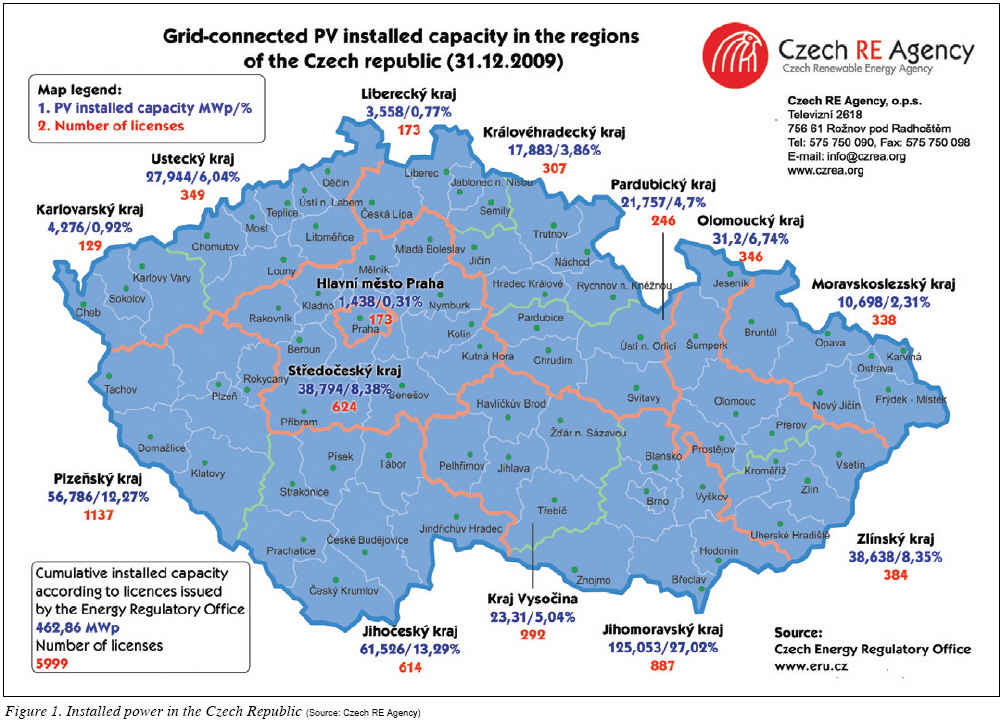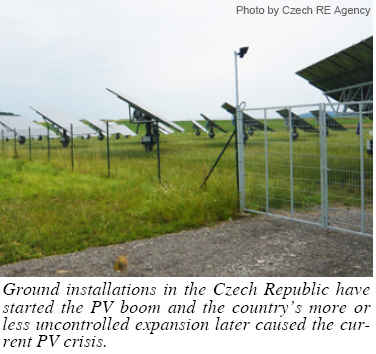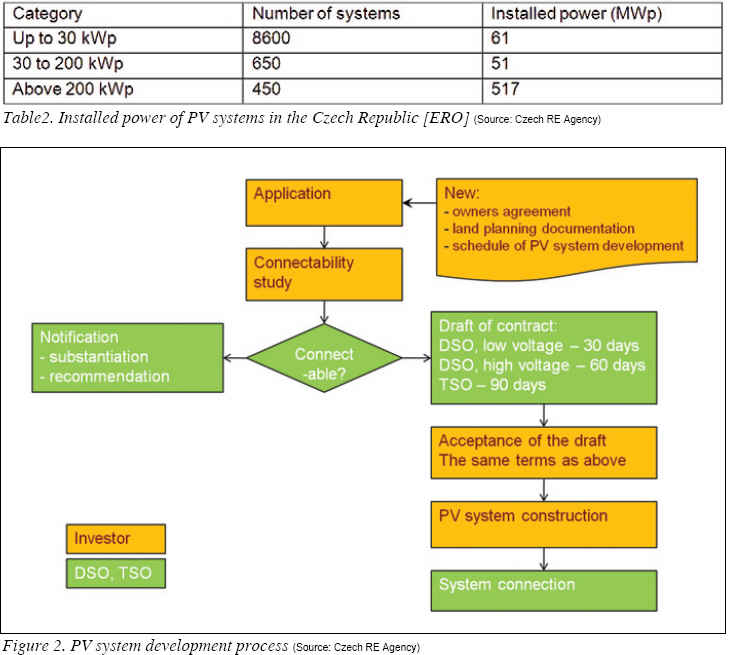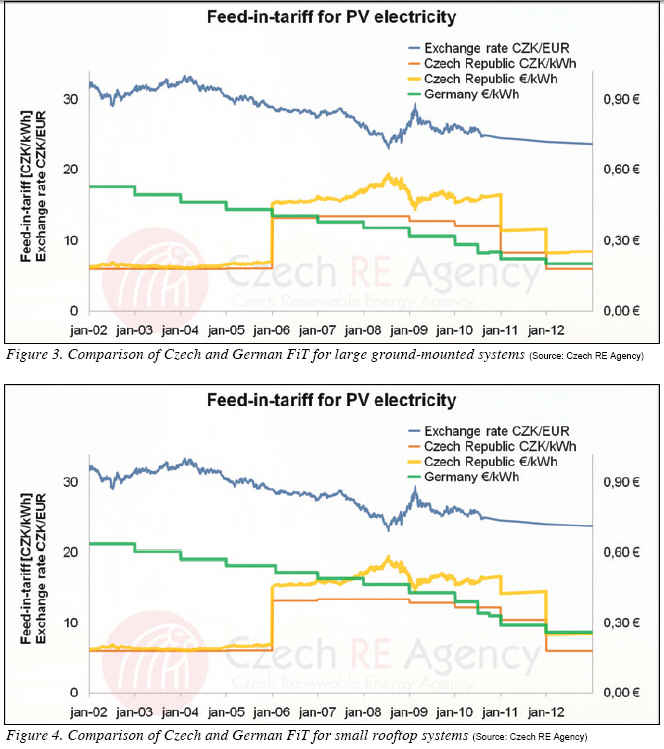.jpg)
By Ing. Bronislav BechNIk, Ph.D.
.jpg) Photovoltaics (PV) as separate branch started in the Czech Republic in the early 1990s. Several companies, mostly originated from former company Tesla, produced photovoltaic cells and modules as well as silicon ingots and wafers. From that period, only one company--Solartec, s. r. o.--sustained until recently. Photovoltaics (PV) as separate branch started in the Czech Republic in the early 1990s. Several companies, mostly originated from former company Tesla, produced photovoltaic cells and modules as well as silicon ingots and wafers. From that period, only one company--Solartec, s. r. o.--sustained until recently.
The first version of Feed-in Tariff (FiT) for Renewable Energy Sources (RES) was introduced in 2002 by Notice of Ministry of Industry and Trade No. 252/2001 Coll. about purchasing of electricity from renewable energy sources and combined heat and power generation. Priority connection, transmission and distribution of electricity from renewable sources were done by Energy Act (No. 458/2000 Coll.).
For photovoltaic electricity, the FiT was set to unprofitable level 6.00 CZK/kWh (about 0.19 /kWh depending on exchange rate CZK/EUR). That is why until the end of 2005, besides several off-grid systems, nearly all photovoltaic systems were installed only under subsidy schemes such as Sun to Schools or Operational Programme Environment and in several cases by municipal subsidies. For example, capital city Praha (Prague) provided investment subsidies up to 4,000 CZK/m2 (150 /m2) in 2008. Actually, all such subsidies are abandoned regarding too profitable FiT.

In 2004, Czech RE Agency was established for promotion of renewable energy sources and especially photovoltaics in the Czech Republic and for promotion of Czech photovoltaic abroad. Actually Czech RE Agency is participating in several international projects under Intelligent Energy Europe programme including PV NMS NET and PV Legal. 
Profitable Feed-in Tariff
When entered the European Union, the Czech Republic committed itself to covering 8 % of final consumption of electricity by 2010. Proposal of a new act on promotion of renewable energy sources was prepared in 2004 in parallel to amendment of Energy Act and National Energy Policy. Nevertheless the act passed in 2005 and new version of feed-in tariff was introduced from beginning of 2006.
Together with the newly defined feed-in tariff, a new support scheme was introduced--Green Bonus (GB). Actually, the feed-in tariff guarantees less than 15-year payback time with adequate profit. Green bonus is based on difference between feed-in tariff and predicted market price of conventional electricity; payback time or profit is not guaranteed. Green bonus is more profitable in case the operator of a photovoltaic plant is trading the electricity at better-than-usual market price or in case a significant part of electricity produced is self-consumed.
Initially the feed-in tariff for photovoltaics was set to 13.20 CZK/kWh (0.45 /kWh). Green bonus was set to 12.59 CZK/kWh (0.43 /kWh). Until 2008, the feed-in tariff and green bonus had been the same for all categories of PV systems disregarding installed power or location. In 2009, PV installations were split into two categories--up to 30 kWp and above 30 kWp. Because of applied degressions in recent years which were close to 5% maximum, for smaller systems the FiT is only slightly higher; the difference is less than 1%.
That is why in the Czech Republic more than 90% of installed power is realized by systems above 30 kWp. There is no clear evidence for type of installation (ground-mounted or roof-top) in the Czech Republic. It only could be estimated that systems below 30 kWp are mostly rooftop and systems above 200 kWp are mostly ground-mounted (see Table 2). Based on that assumption, it is estimated that at least 80% of installed power in the Czech Republic is covered by ground-mounted systems.
Other Conditions
 Contract period was set to 20 years for all categories of renewable energy sources except photovoltaic with contract period 15 years and small hydro with contract period 30 years. In 2008, the contract period was prolonged to 20 years for photovoltaics regarding expected lifetime of photovoltaic modules, which is generally over 25 years. Contract period was set to 20 years for all categories of renewable energy sources except photovoltaic with contract period 15 years and small hydro with contract period 30 years. In 2008, the contract period was prolonged to 20 years for photovoltaics regarding expected lifetime of photovoltaic modules, which is generally over 25 years.
For newly installed systems, FiT could be reduced by up to 5% yearly depending on development of investment prices in relevant category of renewable energy source. For photovoltaic degression nearly to 5% is applied until 2008/2009. Happily for investors but unfortunately for end consumers strengthening of the Czech currency and drop of investment cost of photovoltaic systems were much faster than degression limit in 2008 and 2009. Feed-in tariff stays much over optimal profit which is IRR=10% according to a survey of EPIA. Actually, payback time is much less than 10 years in the Czech Republic.
Feed-in-tariff for systems commissioned in the previous years is adjusted to inflation in the range from 2% to 4% depending on Industrial Producer Price Index (IPPI) published by the Czech Statistical Office. The adjustment is 2% if the IPPI is below 2%, 4% if the IPPI is above the range and equal to IPPI between the range. For example, in 2010 the feed-in tariff is 14.37 CZK/kWh (0.58 /kWh) for systems commissioned in 2006; in 2020 feed-in tariff for that systems will be between 17.51 and 21.27 CZK/kWh (i.e., up to 1.00 /kWh depending of exchange rate).
In addition, tax holidays in the year of commissioning and in the following five years could be applied by operator of renewable energy source of electricity.
Licence for production of electricity has the same impact as trading licence. Even for 5 kWp, the operator of PV system is obliged to register to the revenue authority and to register and pay for health and social insurance. On the other hand, he is not allowed to apply for relief in unemployment.
Actual Legislative Changes
In connection with unexpected boom, a series of legislative changes occurs this year. The changes were officially started by solicitation of Czech transmission operator EPS to distribution systems operators to stop connections of new renewable energy sources due to virtual risk of instability of electricity grid caused by unmanageable renewable sources, especially photovoltaics and wind.
First of the changes is so-called small amendment of Act No. 180/2005 Coll. on promotion of renewable energy sources. The amendment was passed in April 2010 and will be used for the first time for FiT assessment for the year 2011. It allows the Energy Regulatory Office to reduce feed-in tariff for systems commissioned in next year by more than 5%. Other parts of the Act, for example 15-year payback period, are unaffected.
So-called large amendment of Act No. 180/2005 Coll. is officially motivated in need of introduction of Directive 2009/28/EC of the European Parliament and of the Council on the promotion of the use of energy from renewable sources and amending and subsequently repealing Directives. But contrary to mentioned directive, proposed amendment contains no operational support of production of heat from renewable sources. Strict cap is proposed for every category of renewable energy sources by interconnection of the Act with National Renewable Energy Action Plan (NREAP). If the installed power of some category reaches the limit defined in NREAP, no support will be provided for the category in the following year. Additionally, global limit for FiT of 6.00 CZK/kWh is introduced; if applied, it will stop rooftop installations.
National Renewable Energy Action Plan was adopted by the government in July 2010. What is proposed as minimum goals by the commission, it is defined as maximum limit in Czech legislation by interconnection of NREAP with large amendment of Act No. 180/2005 Coll. For photovoltaics, there is in NREAP defined limit of 1,650 MWp in 2010 and for the following years, the limit is incremented by 5 MWp yearly up to 1,695 MWp in 2020. By Czech transmission system operator EPS, it is expected the limit could be reached this year.

Notice 51/2006 Coll. on conditions of connecting was amended by notice No. 81/2010 Coll. The aim of this amendment is to reduce speculative reservations which are blocking real investors and, if all realized, could virtually endanger transmission and distribution system safety. The amendment built new administrative barriers for PV system development (see Figure 2). For example, distribution system operators could connect small PV system within 180 days after contract signature regardless the commissioning of small systems takes less than one week. Large PV systems have to be connected within 1 year.


Notice ERO No 475/2005 Coll.
Calculation of FiT is based on technical and economical parameters published in Notice ERO No. 475/2005 Coll. The parameters are only for information--they are not requirements. On the other hand, if a real system reaches the published parameters 15-year payback time with adequate profit is guaranteed. As the degression is by Act No. 180/2005 Coll. limited to 5%, the FiT is much higher than calculated by numbers in Table 3.
Till this time, the notice was amended every two years, but amendment in this year is still possible. Energy Regulatory Office in reaction to drop of investment cost in 2009 investigated investment costs of new PV projects
Actual and Near Future FiT
Actually, the feed-in tariff for newly installed photovoltaic systems in the Czech Republic is 12.25 CZK/kWh (0.50 /kWh) for small systems up to 30 kWp and 12.15 CZK/kWh (0.49/kWh) for larger systems above 30 kWp including ground-mounted ones. Green bonus is 11.28 CZK/kWh (0.46/kWh) and 11.18 CZK/kWh (0.45/kWh) respectively.
Prices of PV components and whole systems are calculated in euros by nearly all Czech companies and finally converted to national currency--Czech Koruna (CZK). Because of the instable exchange rate (see Figure 3), it made great space for speculations.
In the graphs in Figure 3 and Figure 4, the Czech FiT is compared with correspondent FiT in Germany. Feed-in tariffs in Germany for 2011 and 2012 are based on actual amendment of German FiT law and estimations of installed capacity in Germany, which is expected to be above 5,000 MWp in 2010 and above 3,000 MWp in 2011.
Estimation of Czech feed-in tariff for 2011 is based on ‘small’ amendment of Act No. 180/2005 Coll. (passed in April 2010) and actual version of Notice of ERO No. 475/2005 Coll. (ammended in 2009). FiT for 2011 is expected to be about 10.50 CZK/kWh (0.43 /kWh) for small systems below 30 kWp and about 8.50 CZK/ kWh (0.35 /kWh) for other systems including ground-mounted systems. Estimations for 2012 are based on ‘large’ amendment of Act No. 180/2005 Coll. (in preparation)--maximum FiT for all renewable energy sources is capped to 6.00 CZK/kWh (0.25 /kWh).
Compared to other European countries including Germany, the Czech Republic investment costs of PV systems are the lowest in nearly all categories by observations of EPIA. About 10 or 20% higher FiT would be adequate in the Czech Republic. Therefore, especially for small rooftop systems, the proposed FiT for 2012 is unprofitable. On the other hand, installation of systems above 30 kWp is disallowed by newly built legislative barriers.
Ing. Bronislav Bechnk, Ph.D., is Senior Expert of Czech RE Agency, a non-profit organization which promotes savings, renewable energy sources and sustainability (www.czrea.org). Bechnk is a member of the editorial board of the professional online magazine TZB-info and guarantor of Renewable Energy and Savings section of the magazine. He is also an external staffer of the Brno University of Technology, Faculty of Civil Engineering.
For more information, please send your e-mails to pved@infothe.com.
ⓒ2010 www.interpv.net All rights reserved. |



